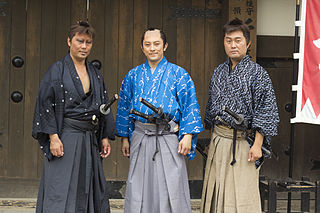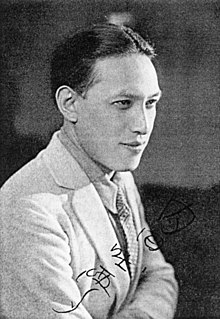
Akira Kurosawa was a Japanese filmmaker and painter who directed thirty films in a career spanning over five decades. He is regarded as one of the most important and influential filmmakers in film history.

Takashi Shimura was a Japanese actor who appeared in over 200 films between 1934 and 1981. He is particularly noted for his appearances in 21 of Akira Kurosawa's 30 films, including as a lead actor in Drunken Angel (1948), Rashomon (1950), Ikiru (1952) and Seven Samurai (1954). He is also known for his role as Professor Kyohei Yamane in Ishirō Honda's original Godzilla (1954). For his contributions to the arts, the Japanese government decorated Shimura with the Medal with Purple Ribbon in 1974 and the Order of the Rising Sun, 4th Class, Gold Rays with Rosette in 1980.

Shōhei Imamura was a Japanese film director. His main interest as a filmmaker lay in the depiction of the lower strata of Japanese society. A key figure in the Japanese New Wave, who continued working into the 21st century, Imamura is the only director from Japan to win two Palme d'Or awards.

Kenji Mizoguchi was a Japanese film director and screenwriter.

Drunken Angel is a 1948 Japanese yakuza film directed by Akira Kurosawa. It is notable for being the first of sixteen film collaborations between director Kurosawa and actor Toshiro Mifune.
Kumiko Onodera, better known as Kumiko Akiyoshi, is a Japanese actress. She won the award for best actress at the 1st Hochi Film Award for Banka, Saraba natsuno hikariyo and Brother and Sister.
Misa Shimizu is a Japanese actress. She made her screen debut by winning the heroine audition for 1987 film Shōnan Bōsōzoku. She starred in NHK's morning drama series Seishun Kazoku in 1989. She portrayed Keiko, the female protagonist, in Palme d'Or winning The Eel directed by Shohei Imamura. She also makes regular appearances in Masayuki Suo's films. She won the award for best actress at the 17th Hochi Film Award for Okoge, Sumo Do, Sumo Don't, Future Memories: Last Christmas.

Yakuza film is a popular film genre in Japanese cinema which focuses on the lives and dealings of yakuza, Japanese organized crime syndicates. In the silent film era, depictions of bakuto as sympathetic Robin Hood-like characters were common.

Daisuke Katō was a Japanese actor. He appeared in over 200 films, including Akira Kurosawa's Seven Samurai, Rashomon, Yojimbo, and Ikiru. He also worked repeatedly for noted directors such as Yasujirō Ozu, Mikio Naruse and Kenji Mizoguchi.
Minoru Chiaki was a Japanese actor who appeared in eleven of Akira Kurosawa's films, including Rashomon, Seven Samurai, Throne of Blood, and The Hidden Fortress. He was also one of Kon Ichikawa's favorite actors.
Shinji Aoyama was a Japanese film director, screenwriter, composer, film critic, and novelist. He graduated from Rikkyo University. He won two awards at the 2000 Cannes Film Festival for his film Eureka.

Yorozuya Kinnosuke (萬屋錦之介) was a Japanese kabuki actor. Born Kin'ichi Ogawa, son of kabuki actor Nakamura Tokizō III, he entered kabuki and became the first in the kabuki tradition to take the name Nakamura Kinnosuke. He took on his guild name (yagō) Yorozuya as his surname in 1971.

Kazuki Ōmori is a Japanese film director and screenwriter.

Yūzō Kawashima was a Japanese film director, most famous for making tragi-comic films and satires.

Chanbara (チャンバラ), also commonly spelled "chambara", meaning "sword fighting" movies, denotes the Japanese film genre called samurai cinema in English and is roughly equivalent to Western and swashbuckler films. Chanbara is a sub-category of jidaigeki, which equates to period drama. Jidaigeki may refer to a story set in a historical period, though not necessarily dealing with a samurai character or depicting swordplay.

Tomu Uchida, born Tsunejirō Uchida on 26 April 1898, was a Japanese film director. The stage name "Tomu" translates to “spit out dreams”.
Jōji Matsuoka is a Japanese film director. After studying filmmaking in the College of Art at Nihon University, he won an award for his independent short Inaka no hōsoku at the Pia Film Festival in 1984. He directed his first commercial feature, Bataashi kingyo, in 1990 and received a number of awards for best new director, including the Hochi Film Award. He won the Japan Academy Prize for best director for his film Tokyo Tower: Mom and Me, and Sometimes Dad. Matsuoka is known for his delicate depictions of complicated romantic and familial relationships, including a homosexual triangle in Kirakira Hikaru, a daughter caring for an abusive but now senile mother in Akashia no Michi, and a son caring for a cancer-stricken mother in Tokyo Tower. He has also shot many television commercials. His best known and most successful TV show is the Midnight Diner - Tokyo Stories.
Sadao Nakajima is a Japanese film director and screenwriter known for his work in yakuza films and jidaigeki.

Kajirō Yamamoto was a Japanese film director, screenwriter, and actor who was known for his war films and comedies and as the mentor of Akira Kurosawa. The combined list of his efforts as a director for documentaries, silent, and sound films includes over 90 film titles during his lifetime.
Jōji Ohara was a pioneering Japanese cinematographer.













